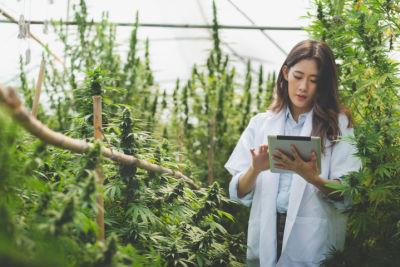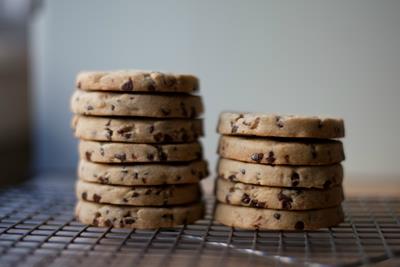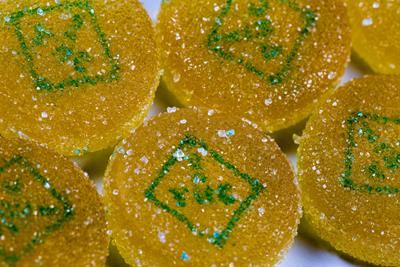
Saturday January 8, 2022
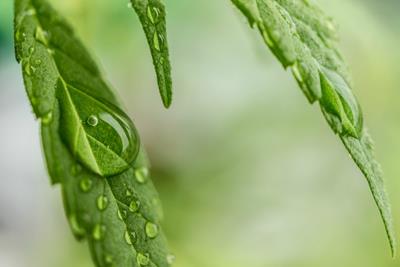 Education
Education
Cannabis legalization has led to a large and lively edibles market including high-end confections, savory dishes, and a revolution in home infusing from coffee to cream to Thanksgiving dinners. But through it all, cannabis drinks have been few and far between. The primary reason for this is that THC, the psychoactive compound cannabis is known for, is not water-soluble, meaning it does not dissolve into water for quick and simple digestion.
Many drinks have experimented with small amounts of oily concentrates to varying degrees of success, but all along, water-soluble THC has been to the edibles market what the moon landing was to the Space Race. So where are all the THC drinks, and packets of powdered THC?
In this article, we review the science behind water-soluble THC, the benefits of it compared to smoking or edibles, and what else to expect over the horizon.
How is Water-Soluble THC Made?
THC is a lipid, or fat, with incredibly low solubility in water: 0.003mg/ml. For perspective, a standard edible dose of 10mg THC would require over three liters of water to dissolve. Like other aromatic terpenoids, THC readily dissolves in other lipids and alcohol. This has been exploited for the production of myriad oil- and alcohol-based beverages on the current cannabis market.
For those seeking THC without alcohol, the options are limited to cannabis beverages that attempt to mix oils with water. Inevitably, emulsifiers have been required for this task.
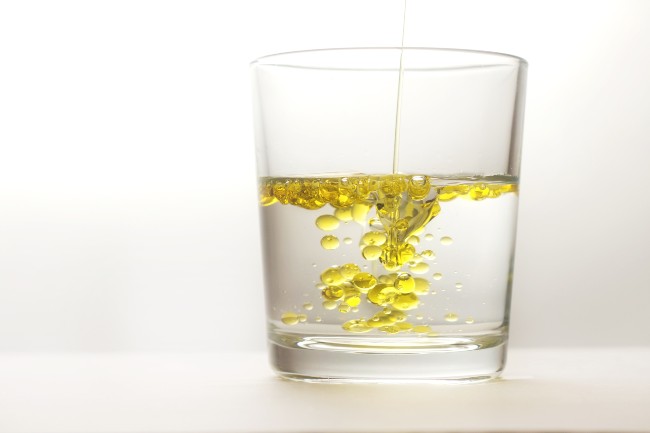
Like raw milk, or a vinaigrette, these mixtures can settle and separate, requiring a vigorous shake or stir. Traditionally, these oils did not hide well, often dictating the flavor and mouthfeel of the final product.
However, recent advances in emulsion science, genetic modification, and cannabis chemistry have resulted in near-completely water-soluble THC. This opens the door to entirely new products that had until now been out of reach. Given the infancy of this new field, many companies and brands are coming to market with wildly different approaches to the same goal.
The Science Behind Water-Soluble THC
Most water-soluble THC products currently available have taken advantage of innovative oil-based delivery methods. Producers have learned from molecular gastronomy and modernist cuisine, employing technology to rethink food.
These micro-emulsions are usually achieved by packaging cannabis extracts into tiny bubbles, or micelles. Vegetable starches like maltodextrin, and ‘carrier oils’ mediate this process. These ‘micro-bubbles’ can easily be blended into water or other liquids with a little shake or stir. PHOTO CURRENT OKThis process is employed for prepared and packaged beverages, many of which are low- or zero-calorie and make use of different approaches to mask the minimal remaining flavor and texture. Some employ carbonation and familiar archetypes like cider or beer to forego even more minimal additives.
A few other brands take this microencapsulation a step further by drying the final product into a fine powder. This is the most advanced form of water-soluble THC so far, with the option to add it directly to any drink or food. These are edibles that have brought convenience and discretion to a new level. In fact, for safety’s sake, the creator of Ripple, a dissolvable powder made by Stillwater Brands, stresses that the product doesn’t dissolve clear, preventing any surprise additions to your drink.
The Future of Water-Soluble THC
While they’re not currently available, some products will soon be released that remove the need for additives or emulsifiers entirely. In their purest forms, they are nothing more than flavorless THC in purified water. The approaches being pursued are innovative and much more advanced than your average emulsion.
Trait Biosciences solves the problem of solubility by learning from our own bodies and the cannabis plant itself. By attaching a sugar molecule to THC, something organisms naturally do, the compound instantly becomes water-soluble. They accomplish this ‘glycosylation’ both directly in genetically-modified plants, and after the fact through enzymatic fermentation.

Infusion Biosciences claims their ‘Aqueous Phytorecovery Process’(APP) produces a whole-plant extract dissolved in only water, THC and all. A THC drink derived from this technology has yet to hit stores, but in August 2020, Infusion Bio announced a partnership with Kalo to release a drink that utilizes this process with hemp, infusing Kalo with full-spectrum CBD.
Why Water-Soluble THC is Great for All Consumers
For a dozen different reasons, fewer people are smoking cannabis, and turning to other alternatives for their THC infusions. The edibles market has exploded to fill the gap, with products both savory and sweet. While convenient, long-lasting, discrete and tasty, this booming form of consumption brings along new challenges.
The nature of eating cannabis both delays and extends the effects, progressing through digestion before hitting the bloodstream. This often results in variable and unpredictable timeframes for the experience. These unforeseen consequences are one of the primary reasons people report avoiding edibles.
Conversely, water-soluble THC, when consumed on an empty stomach, can take full effect within 15 minutes.
From a medicinal perspective, this fast onset is incredibly useful for prompt relief. Recreationally, the equally accelerated duration can be appealing for those that have things to do later in the day. Further, liquid or powder delivery allows for precise mixing and dosing: no more surprises from a strong corner of the brownie.
Finally, something most edibles can’t claim: water-soluble THC rarely has more calories than if it had been smoked. Many water-soluble THC products have very low calorie counts, owing only to added sugars, oils or other ingredients. Along with the calories, the characteristic cannabis flavor that imbues so many edibles is nowhere to be seen.
FAQs
Can You Infuse Water with THC?
Water can be infused with THC with the right products, of which there are currently only a few. THC occurs naturally as a lipid, a fatty substance that only mixes with other fatty lipids. In the past, microemulsion has been utilized to infuse tiny bubbles of concentrate into watery drinks, but new technologies are beginning to produce powdered THC that can be mixed into any drink.
Is THC Water Soluble?
No, THC cannot be dissolved in water in its natural state.
How Does THC Become Water Soluble?
Currently, the most common way of infusing water with THC is through nanoemulsion, which breaks THC molecules into tinier nanoparticles. Unfortunately, these are still lipids, and still require an emulsifier, or slight thickening agent, to keep the nanoparticles suspended in the solution (as opposed to separating like, well, oil and water).
Other cutting-edge proprietary methods are being developed by different companies, but don’t expect the science to be revealed until patents are secured.
Are There Any Water-soluble Cannabinoids?
No. All naturally-occurring cannabinoids are fat-soluble lipids.
Have you tried water soluble THC? Share your thoughts and experiences in the comments below.



